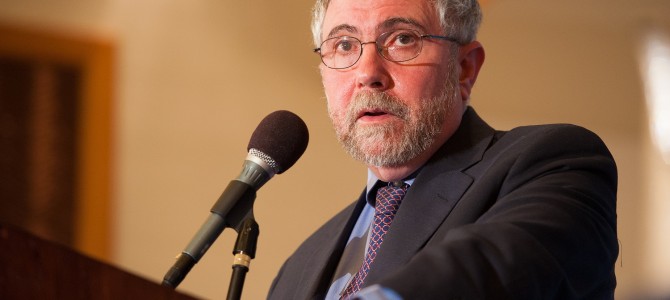This week, New York Times columnist and erstwhile economist Paul Krugman railed against all those who predicted Obamacare would be a catastrophe. Recall that many conservative commentators said premiums would skyrocket and trigger a “death spiral” on the exchanges, millions of employees would be forced to work part-time, billions would be added to the federal deficit, and the uninsured rate wouldn’t change much.
Not all those things have happened—or haven’t happened yet—so Krugman unleashed his wrath. “Obamacare is working better than even its supporters expected—but its enemies say that the good news proves nothing, because nobody predicted anything different.” He singles out a recent Wall Street Journal column by investment manager Cliff Asness for special scorn, cherry-picking Asness’s claim that there was never a question that more people would be covered under the Affordable Care Act (ACA) but ignoring the rest of this column (as Jonathan Chait did) including this important admission:
In fairness, both sides of the debate made some bold claims five years ago, and ObamaCare’s supporters have things to point to other than these two ubiquitous tricks. There is no evidence of the upward cost spiral some detractors predicted. Similarly, there is scant data that the ACA caused employers to shift full-time workers to part-time positions. Health-care quality and availability have not precipitously declined, and the botched rollout did not cripple the program forever, as some contended.
The point of Asness’s piece, though, was that the two major accomplishments Obamacare’s defenders have trumpeted as proof of the law’s success—increased coverage and slower-than-expected healthcare spending growth—are suspect. The administration has routinely conflated signups with enrollment, and has never accounted for those who were previously insured but lost coverage because the ACA rendered their plans non-compliant.
As for the second claim, that the slowdown in healthcare spending pre-dates Obamacare, Krugman doesn’t address it, probably because many healthcare economists hold this view.
Turnabout Is Fair Play, Paul Krugman
Nevermind, though: “It’s both easy and entirely appropriate to ridicule this kind of thing,” says Krugman. But it’s not enough to mock it, he goes on, because this is serious stuff: “Refusing to accept responsibility for past errors is a serious character flaw in one’s private life. It rises to the level of real wrongdoing when policies that affect millions of lives are at stake.”
Krugman would know—especially when it comes to the health-care law. Consider that in the fall of 2013, when the Obamacare exchanges crashed upon launch, Krugman predicted that the exchanges “will get fixed, and Republicans believing that they’re going to be able to run against the program a year from now are going to do about as well as they did in believing that they could use a shutdown to defund the program.”
A year later, Republicans across the country ran against Obamacare in the midterm elections and won their largest majority in nearly a century. Congressional Republicans gained their largest majority since 1928. The very next day, Krugman admitted that he had been wrong about the political wisdom of running against Obamacare and admitted that the GOP message about the health-care law resonated with voters.
Just kidding. He did the opposite. He told his readers the election results were a good time to remember that Republicans have been wrong about everything and that their intellectual debacle has been “made worse by the striking inability of many on the right to admit error under any circumstances.”
Only Idiots Disagree with Me
The only reason Republicans won in such an historic landslide, Krugman mused, is because “most voters don’t know much about policy details, nor do they understand the legislative process.” They simply saw “the man in the White House wasn’t delivering prosperity—and they punished his party.”
That is, you’ve got to understand the finer points of policy and so forth to know whether Obamacare is working. Normal people simply can’t tell. Republicans simply tricked ignorant voters into thinking a law that’s working “better than expected” is actually doing great harm.
Yes, that must be it. Must be. It can’t be that GOP criticism of Obamacare resonated with what actual Americans were experiencing. It can’t be that conservatives had real reasons underlying their arguments against the law. It can’t be that Obamacare was not delivering what it promised. It must be something else. Republican detractors must have nefarious motives. They must be blinded by ideology. They must be lying.
The focus on motives rather than substance has been called “the paranoid style in public debate,” and it’s practiced by liberals and conservatives alike. The corollary to this approach to public debate is that you can never admit you’re wrong. After all, it might imply that your opponent was correct, not merely dissimulating, and that perhaps the other side has ideas worth considering. It might also mean you’ve been wrong about other things. Perhaps many other things. Maybe going back years.
If that were true, it might also turn out that your many predictions had less to do with facts and more to do with ideology. In that case, as Krugman himself writes, “the utter failure of these predictions should inspire major doubts about that ideology.”
And we can’t have that.









